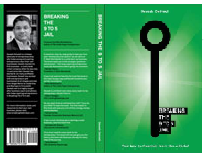Employee Turned Entrepreneur – Jasmin French
Posted Under: Entrepreneur, Entrepreneurship, Our Heroes, Pre-Startup
 With us today is entrepreneur Jasmin French. Though she is no longer working for a big-name law firm, she still uses her law skills while also enjoying life as a self-employed entrepreneur. After being dropped from the corporate world, she fell into a business she loves.
With us today is entrepreneur Jasmin French. Though she is no longer working for a big-name law firm, she still uses her law skills while also enjoying life as a self-employed entrepreneur. After being dropped from the corporate world, she fell into a business she loves.
DD: Who are you and what kind of corporate job were you at?
JF: My name is Jasmin French, and I am the quintessential “connector.” I connect people with ideas, one another, and most importantly, with their personal “story.”
I am a Duke University and Vanderbilt University Law School graduate. Prior to entering law school, I was a logistics/supply chain analyst for one of the world’s largest consumer packaged goods companies (home to some of the most recognized household products). I left to pursue a law degree with a focus on business law to better understand how businesses work and what legal issues those who are in business care about.
At a holiday party in December of 2006 – three months into my first year in law school – I met a senior partner who worked at the largest law firm in the world. We chatted briefly and that same night I was invited back to the firm for some informal meetings. After those meetings, I was granted a summer internship, which eventually led to an offer for a permanent position in the firm’s Corporate & Securities practice.
[pullquote align=”right”]I wish I had known then that membership in the “entrepreneurship club” was not as elusive as I initially thought. I had cautiously approached starting my own business because I naively believed the myths surrounding entrepreneurship: that I needed thousands and thousands of dollars before I started, I needed to jump in with both feet all at once and that I needed a fully functional business plan before I sought my first client.[/pullquote]DD: What made you leave the job? When did you realize that you wanted to be an entrepreneur & why?
JF: Historically, I have always been someone who would rather “jump” than be “pushed.”. That changed in February 2009. My law firm began the first of a series of lay-offs and I found myself on the wrong side of that lay-off (along with almost 40% of my starting class).
In the seven days following the layoff – yes, only seven – I read over performance reviews I’d received over the course of my professional career. I looked for the traits that reappeared over and over regardless of the person writing the evaluation and realized those traits were intrinsically part of my “package.” The problem: those same traits were only seeing the light of day 15%-20% of the time in my role in a large law firm. The solution: find professional opportunities where my intrinsic qualities are utilized, valued and rewarded at a much higher level.
When I realized the solution, I considered entrepreneurism as a potential conduit to get where I needed to be. Being a small business owner, there would be an opportunity to fulfill my purpose as a connector, while giving me the freedom to define what “success” means for me (as opposed to having it defined for me).
DD: What did you do to break the corporate jail? How did you prepare for the employee to entrepreneur transition?
JF: I honestly was unprepared for the mental preparation that is required when going from an employee to an entrepreneur. I had devoted all of my time to the practical preparation: preparing my home office, drafting a business plan, deciding between forming an LLC or a sole proprietorship, creating a website, etc. I underestimated the mental preparation that has to happen from getting used to working alone most days to creating my personal pitch to explain my business in a clear and confident manner. Just because someone is physically removed from “jail” does not mean that the mental shackles are automatically broken! I took a 10-week entrepreneurship class at the country’s oldest center for women in business – the Women’s Business Development Center (WBDC). After that class, an inventory of my skill set and the recognizing of a need in the marketplace created by unprecedented economic turmoil, I created my company in September 2009 and have been reaping the benefits of my decision ever since.
DD: What is one resource that helped the most/best?
JF: My 10-week course with the WBDC was a valuable experience. The structure of completing tasks weekly (with homework) and the camaraderie associated with being in a room of other budding entrepreneurs was instrumental in taking my business concept from idea to reality.
I have committed to reading a book a month (whether to improve my business or to improve myself). There are two books that have been instrumental in helping me blaze a path as a business owner: “The E-Myth Revisited” by Michael Gerber and “REWORK” by Jason Fried and David Heinemeier Hansson. These books always re-focus me. They remind me of the importance of “working on my business” and not just “working in my business.”
DD: What do you know now that you wish if only you knew when you made the transition?
JF: I wish I had known then that membership in the “entrepreneurship club” was not as elusive as I initially thought. I had cautiously approached starting my own business because I naively believed the myths surrounding entrepreneurship: that I needed thousands and thousands of dollars before I started, I needed to jump in with both feet all at once and that I needed a fully functional business plan before I sought my first client.
I know better now. I realized that I was giving power to the same parameters that confined me while I was working in the corporate world. I removed the self-imposed boundaries and just started. My mantra is “Look before you leap … but don’t forget to jump.” Planning is extremely important but it cannot occupy so much of your time that it paralyzes you into inaction.
On a personal note, I now know that I cannot confuse someone’s indifference or lack of support for a judgment on my potential to succeed. Not everyone is excited that you’ve escaped the 9 to 5 jail – because they are still there! Their deficiency of enthusiasm is not an indictment on my ability. Instead, I look to family, close friends and other entrepreneurs for support and encouragement.
DD: What are your suggestions for aspiring entrepreneurs? (My fav!!)
JF: I consult clients, professionals, entrepreneurs, students, etc. on how to get noticed and how to be remembered. A powerful personal brand (in person and on-line) is the vehicle that takes you from being one among the masses to distinguishing yourself from the masses.
I encourage aspiring entrepreneurs to spend an adequate amount of time crafting their personal brand. Ask yourself the following questions: “What features do I deliver on a consistent basis which promise a benefit to my clients?” “What about my value proposition makes me unique?” and “How do my achievements have transferable value to my target market?”
Finally, I implore entrepreneurs to develop their personal pitch in a way that clearly and succinctly describes what they do and who they are. Think about it: People only remember what you tell them. Make sure what you are telling them is memorable enough that they rush out and tell someone else!
DD: How are you doing and how do you feel now?
JF: I am fulfilling my purpose and doing it on my own terms – (read: I’m fanastic!). To keep my stress level (slightly) lower, I still use my legal skills on a project basis to ensure additional income, but it’s done on my own terms. I once read that an employee would have to make twice as much in take-home pay to equal the happiness that entrepreneurs experience. I couldn’t agree more!
After being pushed out of the law firm she worked for Jasmin French took matters into her own hands and started making connections. She now helps people connect in different ways. One point I hope you made a note of is – there are no pre-requisites like having a certain amount of money or a full business plan etc before getting started. What really matters is taking the first step & getting started. Another part that sticks out to me is when she said, “Not everyone is excited that you’ve escaped the 9 to 5 jail – because they are still there!” So very true! Keep those doubters at a distance and build up a wall of people in a similar situation as yours. It’s easier to get through a new situation when you can communicate with the people that are in the same boat.
Have you escaped the 9 to 5 jail? Please share with us via comments below.
Wanna be out of the rat race? Contact us today!





